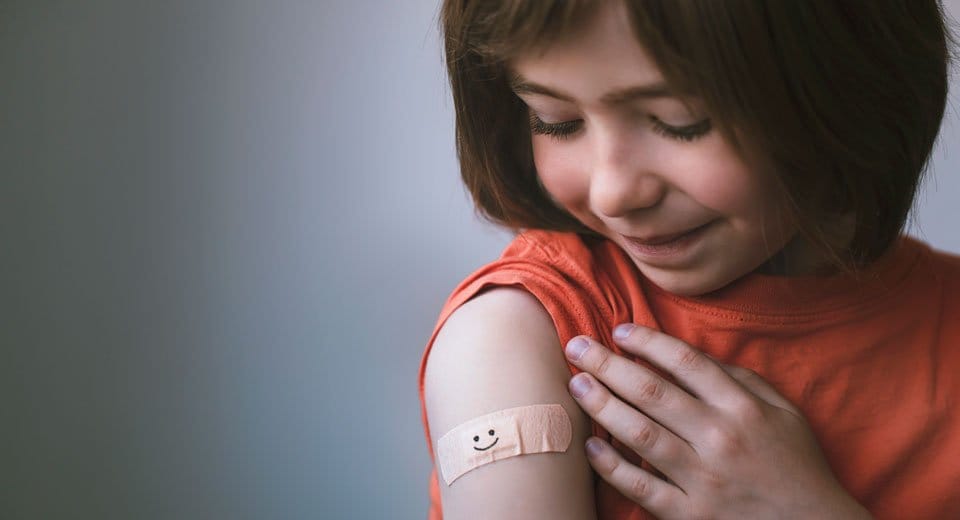How to talk with your kids about the COVID-19 vaccine

Showing your kids you’re excited about getting the COVID-19 vaccine is probably more important than anything you can tell them, says Cape Cod pediatrician Leif Norenberg, MD.
Now that children 12 and older can get the COVID-19 vaccine to help protect against getting the COVID-19 virus, parents have new questions to field. Dr. Norenberg, who practices at Briarpatch Pediatrics in Sandwich and Yarmouthport, answers those questions for patients and their families. He’s recently been a guest speaker on the subject at community groups, helping to make sure people have the facts they need.
“The bottom line is the vaccine is far safer than the COVID-19 infection,” Dr. Norenberg said. He calls the COVID-19 vaccine a gift, and he’s excited about the opportunity for children and teens who are 12 and older to be vaccinated against the virus that shut down the world for so long.
Kids Watch How You Act
Dr. Norenberg suggests parents lead by example and model the behavior they would like to see from their children.
“Get the vaccine, show your kids you’re thrilled, and act like you’ve won the lottery. If you’re happy, your kids will be happy to get the vaccine,” he said. “The vaccine is a beautiful public health gift that protects us against the COVID virus.”
Children younger than 12 are still not eligible for the vaccine, but Dr. Norenberg anticipates they will become eligible within the next several months.
“Until all of my patients can get the vaccine, I’d love the rest of the world who can get vaccinated to be vaccinated,” he said. “We are lucky to have the vaccine, and those who get it are protecting not only themselves, but everyone around them.”
Be Honest With Children and Teens
Children and teens are informed and aware—or, at least they want to be. They are bombarded with information and misinformation in social media and in social situations as seemingly safe as the playground or school bus. The best thing parents can do is be informed and honest. Tell your child or young adult what to expect, said Dr. Norenberg.
“One thing I would not recommend saying to your children is that it doesn't hurt, since that would be dishonest,” he said. “It does sting a bit when the shot is administered.”
Dr. Norenberg suggests one way to lay out the reasons for getting the vaccines could be by saying: “I know it's not fun to get shots, but this one, luckily, will protect you from getting really sick from the COVID-19 virus, and it will also help protect Grandma and Grandpa, and others who aren't quite as strong as you, from getting sick from the virus.”
Facts About Kids and the COVID-19 Vaccine
On May 12, 2021 the American Academy of Pediatrics (AAP) issued a statement endorsing the U.S. Centers for Disease Control’s (CDC) recommendation calling for children ages 12 and above to get the COVID-19 vaccination.
“This is truly an exciting development that allows us to protect a large population of children and help them regain their lives after a really rough year,” said AAP President Lee Savio Beers, MD, FAAP. “As a pediatrician and a parent, I have looked forward to getting my own children and patients vaccinated, and I am thrilled that those ages 12 and older can now be protected. The data continue to show that this vaccine is safe and effective. I urge all parents to call their pediatrician to learn more about how to get their children and teens vaccinated.”
Vaccination rates are a moving number, constantly in flux, but Dr. Norenberg noted that after the first month, the CDC reported that more than four million teens and 12-year-olds in the U.S. had received the vaccine.
“More than 13,000 children have been hospitalized in the U.S. due to COVID-19,” he said, adding that there have been approximately 300 deaths among those 18 and younger due to COVID-19.
What About Vaccine Side Effects?
Most side effects are a sore arm at the injection site, tiredness, even mild fever, but those are good signs your body is building immunity against the virus, he explained.
According to Dr. Norenberg, the medical community is aware of and watching for swelling in or around the heart (myocarditis and pericarditis) which, as of June 21, 2021 has been reported in more than 300 U.S. adolescents and young adults after COVID-19 vaccination.
“I agree with the CDC that the known and potential benefits of COVID-19 vaccination outweigh the known and potential risks, including the possible risk of myocarditis or pericarditis. Symptoms include fever, fatigue, chest pain and shortness of breath,” he said. “Most cases have been mild so far and have resolved with rest and basic supportive care.
“What I tell parents about all vaccines is that the benefits far outweigh any small risks.”
Anyone with questions about free COVID-19 vaccines for kids and teens can go to the U.S. Centers for Disease Control website or check with their pediatrician or family doctor.
